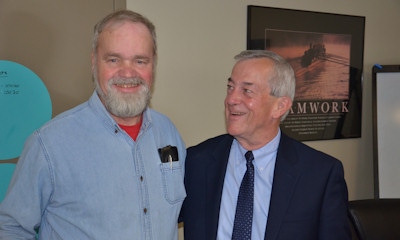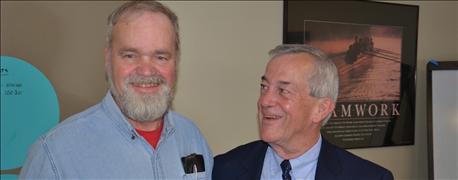
Attribute it to the fact people are realizing there are good paying jobs in agriculture, both for college-trained and vocational-trained students. Maybe it has to do with an overall emphasis at the state level on vocational education. Perhaps more schools are seeing the value of FFA leadership development. Whatever the reason, more schools are wanting to start ag programs, or reopen ag programs which have been closed.

FIELD TRIP: Mark Russell, right, visited the Indiana Ag Teachers Association meeting at the Indiana FFA center at Trafalgar earlier this year, telling them of plans at Purdue. Here he talks with Joe Park, left, director of the Center and a former ag teacher.
Just in FFA’s District 8 alone, in central Indiana, one of 12 districts, three chapters were recently recognized for restarting vo-ag and FFA programs this year. All three had programs at some point in the past. They include Cascade in Hendricks County, and Monrovia and Mooresville in Morgan County.
The catch is that there aren’t enough trained teachers in ag education to go around. There are apparently about 12 students graduating in ag education from Purdue this spring, and rumors are that not all of them want to teach. There are already teacher openings in existing programs for 2016-17, and it’s only mid-March.
Related: Meet the man who heads up ag education and ag communication training at Purdue University
Enter Mark Russell, who became the head of the Youth Development and Ag Education Department at Purdue in August of 2015. Here is a short interview with Russell.
What is your goal for the ag education program?
Russell: The Dean, Jay Akridge, charged me with doubling enrollment in ag education in five years. Our other programs in the department are important, but our priority is to increase the number of students in ag education.
What are you doing to move toward that goal?
Russell: We have a full-time person now dedicated to working with students who are interested in ag education. That person is Amy Conrad. In addition, for the past 18 months, we have had a program funded through the Indiana State Department of Agriculture, which provides two mentors to assist young teachers in the field. Former teachers Beth Theobald and Charity Keffaber have done a good job getting that program off the ground. They have helped set up a network of veteran teachers who mentor beginning and young teachers.
Do you anticipate other initiatives within the department?
Russell: Yes. One faculty member moved into a different slot where he is very qualified to fill other needs. We are hoping to get the Ok to fill that position, and have another faculty member devoted to teaching and working with ag education students here at Purdue.
Are there outreach efforts?
Russell: Yes. This year our staff held Teach Ag Day to get prospective students interested in ag education on campus, and it was a success. There is also a fairly new program called Tag a Teacher, where existing ag teachers nominate, or tag, one of their students as someone who might be a good candidate to be an ag teacher. Those teachers and students are recognized at the Indiana FFA State Convention in June.
What are some of your challenges?
Russell: We have to work within the system. We just can’t make huge changes overnight. Change take time in a university system, but when everyone is dedicated to making it happen, it’s possible. We’re confident we can attract more students and turn out more qualified ag teachers than in the past.
About the Author(s)
You May Also Like




